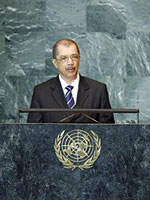Seychelles
H. E. Mr. James Alix Michel, President
25 September 2008
- Video: English [RealPlayer - 16 min]
- Statement: English [PDF]
- Back to the list of speakers
Statement Summary

© UN Photo
Click for caption and to enlarge
JAMES A. MICHEL, President of Seychelles, said new enemies “are staring us in the face”. Hunger, pandemics, poverty, economic turmoil, environmental degradation and the iniquity of the global trading system, were enemies, which, if not overcome, could shatter the foundation of civilization. As President of Seychelles, one of the smallest nations in the world, with 87,000 people who lived in trepidation, he appealed to the conscience of everyone gathered in the Assembly hall to create a better world. That could be achieved through vision and bold leadership, with leaders setting clear commitments, and working to resolve the climate, energy and food crises among others. That vision should also encompass fairness and justice in trade, where the issues of small island developing States were recognized and taken up to promote their development.
He said the skewed nature of global trade was an impediment to his country. Not only did some wealthy nations hand subsidies to their farmers, but developing countries were obliged to follow World Trade Organization rules to the letter, even when they undermined domestic economic policies created to protect vulnerable people. Foreign investors exploited the country’s natural resources. For example, Seychelles received only 7 per cent in revenue, made up of licence and transhipment fees, from the total value of the tuna (its so-called “blue gold”) caught and shipped by foreign fishing vessels in its waters.
Another impediment to development was the fact that Seychelles had a high human development index ranking and was excluded from access to grants and soft loans to expand development. At the same time, it fell into the category of Highly Vulnerable countries, as defined by the Commonwealth Vulnerability Index.
And like many other small island States, Seychelles remained vulnerable to the threats posed by global warming, climate change and rising sea levels. It was not right that the small island risked being submerged by rising seas while other nations refused to acknowledge their responsibility for the environmental pollution that threatened the planet’s resources. With the support of international non-governmental organizations, Seychelles had started a global movement –- the Global Island Partnership -- to get all small islands, and nations with islands, to devote part of their natural resources to environmental resilience and sustainability.
Turning to food security, he said the international community must end the food crisis and provide food at affordable prices to ordinary people. Industrialized countries needed to remove subsidies given to their farmers and provide the global South with urgently-needed resources to improve its infrastructure. This would let the South produce more food and feed its own peoples. A revamped United Nations system was the best place to achieve progress in these areas: food security; trade; climate change; and energy. He called for a clear action plan, not more repetitive conferences and “talk shops”.
[Source: GA/10754]